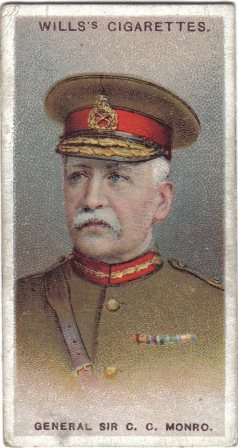30 October 1915
General Sir Charles Monro, Headquarters, Mediterranean Expeditionary Force - Harassed by Kitchener not to take his time, Sir Charles Monro visited all three bridgeheads of Helles, Anzac and Suvla on just a single day: 30 October. His report back to Kitchener was a coruscating indictment of the dreadful state of affairs and he later summed up the situation in no uncertain terms in his despatch.
 "The positions occupied by our troops presented a military situation unique in history. The mere fringe of the coast line had been secured. The beaches and piers upon which they depended for all requirements in personnel and material were exposed to registered and observed artillery fire. Our entrenchments were dominated almost throughout by the Turks. The possible artillery positions were insufficient and defective. The force, in short, held a line possessing every possible military defect. The position was without depth, the communications were insecure and dependent on the weather. No means existed for the concealment and deployment of fresh troops destined for the offensive - whilst the Turks enjoyed full powers of observation, abundant artillery positions, and they had been given the time to supplement the natural advantages which the position presented by all the devices at the disposal of the field engineer."
"The positions occupied by our troops presented a military situation unique in history. The mere fringe of the coast line had been secured. The beaches and piers upon which they depended for all requirements in personnel and material were exposed to registered and observed artillery fire. Our entrenchments were dominated almost throughout by the Turks. The possible artillery positions were insufficient and defective. The force, in short, held a line possessing every possible military defect. The position was without depth, the communications were insecure and dependent on the weather. No means existed for the concealment and deployment of fresh troops destined for the offensive - whilst the Turks enjoyed full powers of observation, abundant artillery positions, and they had been given the time to supplement the natural advantages which the position presented by all the devices at the disposal of the field engineer."
After further commenting on the problems posed by disease, shortage of competent officers, the Turks’ ability to hold their positions with a reduced force, while deploying elsewhere and of course the lack of any hope of a successful advance, Monro’s solution was direct and to the point.
"Since we could not hope to achieve any purpose by remaining on the Peninsula, the appalling cost to the nation involved in consequence of embarking on an overseas expedition with no base available for the rapid transit of stores, supplies and personnel, made it urgent that we should divert the troops locked up on the Peninsula to a more useful theatre. Since therefore I could see no military advantage in our continued occupation of positions on the Peninsula I telegraphed to your Lordship that in my opinion the evacuation of the Peninsula should be taken in hand."
On 3 November, Monro departed on a visit to Egypt to discuss the impact of an evacuation, leaving Birdwood in temporary command. Churchill later famously pilloried Monro’s approach as, “He came, he saw, he capitulated!” As an epigrammatic sneer it may have worked perfectly; as a comment on Monro’s eminently sensible reaction it merely highlights Churchill’s total lack of ‘grip’ on strategic matters.
SOURCE:
C. C. Monro, First Despatch, London Gazette, 10/4/1916 (3rd Supplement), W. L. S. Churchill, World Crisis, 1911-1918, Vol. II (London: Odhams Press, 1938), p.908.
